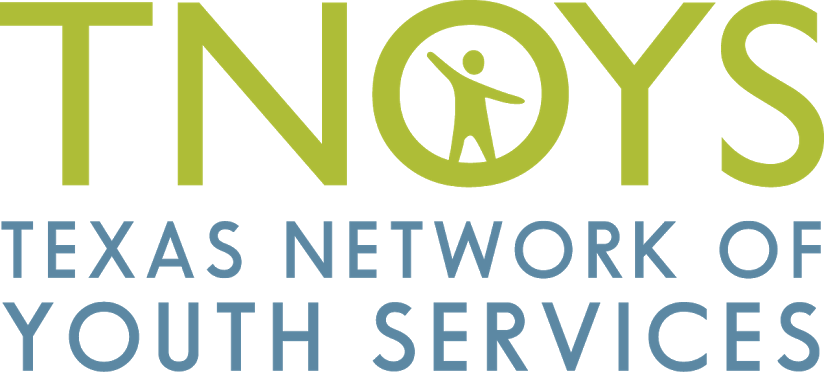Vulnerable youth and young adults (YYA) often deal with health and mental health challenges that — if left unaddressed— can jeopardize their futures. Research shows that trauma can lead to serious physical and mental health challenges in YYA who have experienced abuse, natural disasters, systems-involvement, or marginalization. Comprehensive health services are critical for these YYA, yet young people overwhelmingly report unnecessary obstacles, limited youth-friendly education, and gaps in resources that leave them unable to get the care they need.
In partnership with Episcopal Health Foundation, TNOYS has worked with hundreds of YYA and the professionals that serve them to influence policies and practices that will greatly impact YYAs’ health outcomes. The resource page below showcases TNOYS’ findings from research, listening to, and learning from YYA.
Use the links below to navigate to a particular “theme” from TNOYS’ research with young people and learn more about the issue in their own words.
Barriers to Access and Health Education
Health Stigma and Lack of Trust
Limited Options for Prevention/ Preventative Care
Inadequate Mental Health/ Behavioral Health Support
Lack of Sexual Health Resources/ Education
Barriers to Access and Health Education
Access and knowledge barriers can have a significant impact on YYAs’ health outcomes. Factors like the steep cost of insurance and medication, limited transportation options, and the inability to get time off from work for appointments prevent YYA from getting the care they need. TNOYS frequently hears from youth who have health insurance that they do not know how to use it, find doctors that accept it, or determine their out-of-pocket costs.
What’s more, many YYA report that a lack of youth-friendly education about health care can make it challenging for them to navigate the healthcare system. YYA may be unfamiliar with processes like insurance pre-approval, medical terms, and the distinction between different healthcare professionals. Accessible information on how insurance works, treatments available, and their medical histories could help YYA make fully-informed decisions.1
In their own words:
In the below videos, young adults Tiara, Alex, Montoya, Betty, and I’munique delve deeper into how a lack of access and youth-friendly health knowledge impacted them while involved in the foster care system and/or experiencing homelessness.
Health Stigma and Lack of Trust
Cultural stigma and pressure from peers or family can make YYA hesitant to engage with doctors, use certain treatments, or access mental health support. Additionally, YYA are often wary of engaging with healthcare providers because they often do not have trusting or respectful relationships with the adults in their lives. Too often, an effective healthcare provider-patient relationship is in stark contrast with YYAs’ involvement in other systems because it requires the YYA to be vulnerable with an adult and provides them with a safe space to discuss “taboo” topics and their own identity. It is key for all youth-serving providers and healthcare professionals to build a foundation of trust and mutual respect with YYA patients by listening to them and consistently demonstrating sensitivity to their trauma histories.
In their own words:
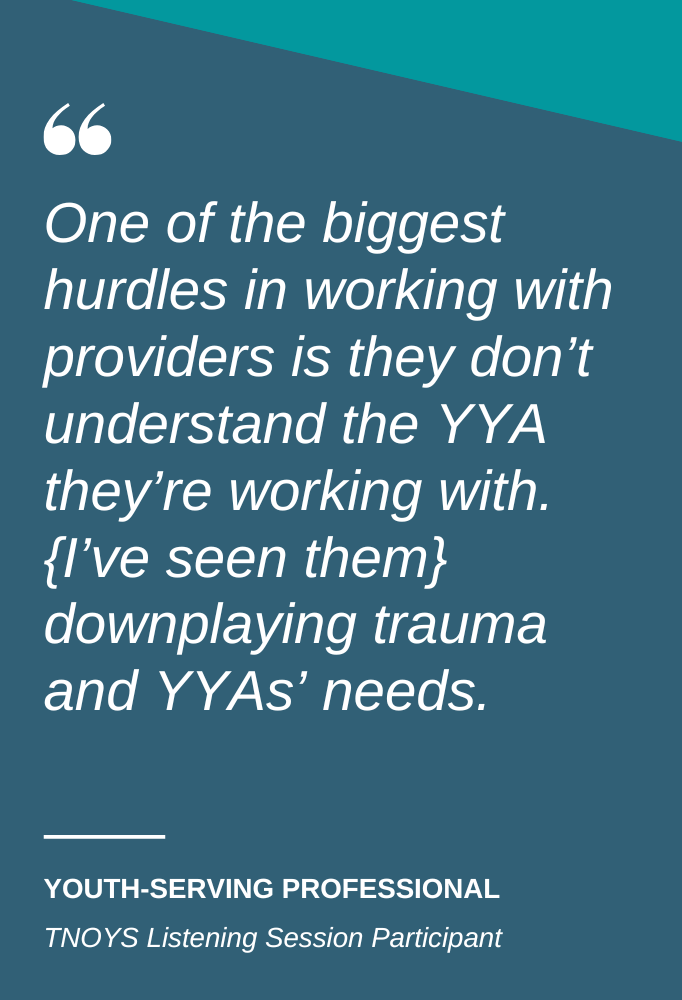
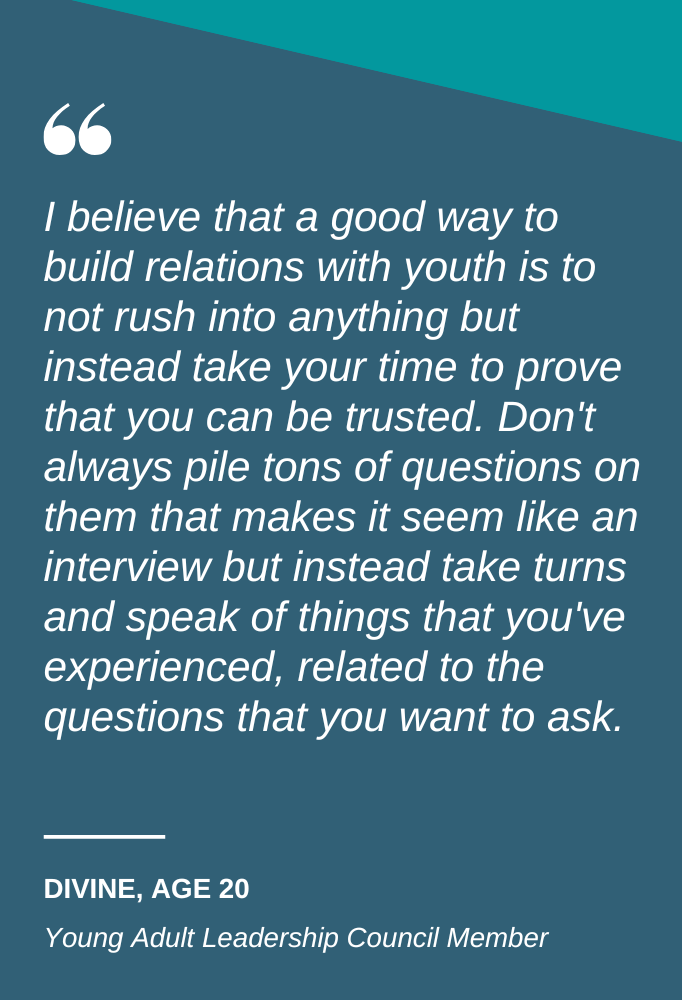
Limited Options for Prevention/ Preventative Care
Often, YYA don’t have access to the care and resources necessary to prevent smaller health issues from spiraling into unmanageable problems. Many YYA report having to skip doctor’s appointments due to changes in their work schedule or a lack of reliable transportation. YYA who do not have health insurance report avoiding doctors or preventative care because they cannot afford the cost of appointments, knowing that if things get bad enough they can go to the emergency room.
As a result, many YYA only receive the care they need when facing a crisis. As a youth-serving professional explained, “Finding psychiatric treatment is near impossible. Facilities are booked six months prior, and they need help now. When there’s no preventative measures for the youth, their only option is to just go to the hospital.”
Additionally, vulnerable YYA can lack basic necessities that often act as preventative healthcare, especially safe and stable housing. When a young person spends all their time and energy on where they will sleep that night or where they will get their next meal, they do not have the time or capacity to think about their health. Because housing instability makes it difficult for YYA to plan for the future, many also report putting off appointments when they are unable to plan the logistics necessary to make the visit.
In their own words:
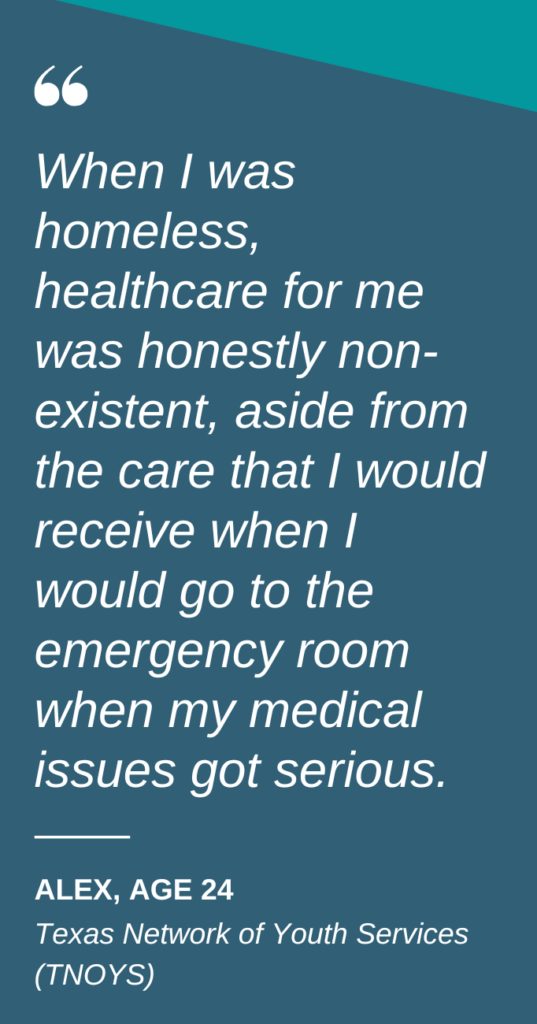
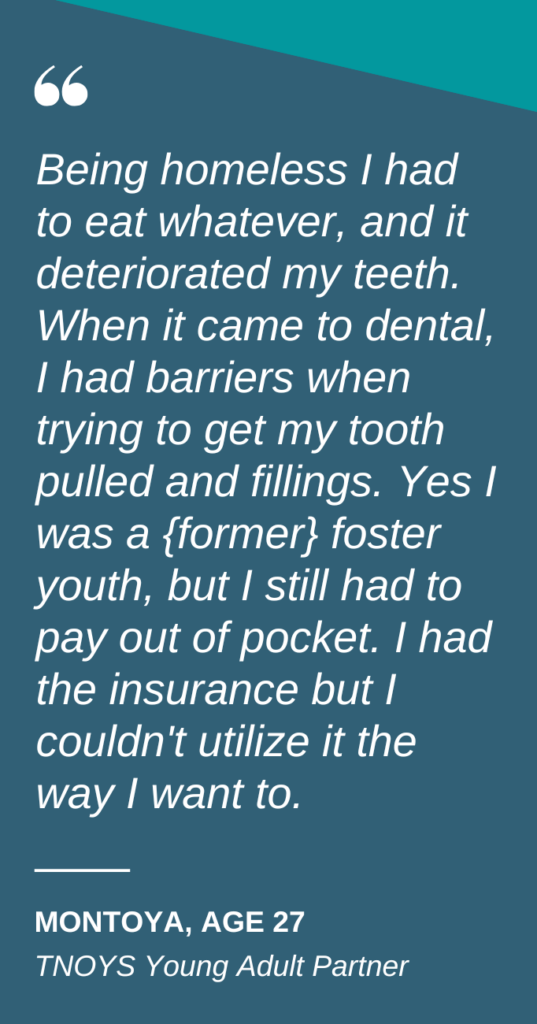
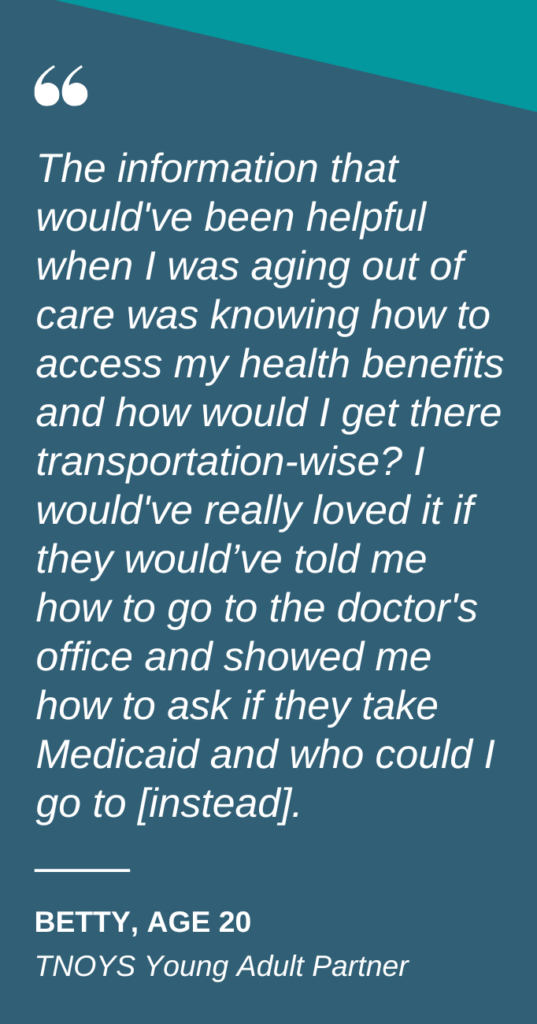
Inadequate Mental Health/ Behavioral Health Support
YYA consistently report that mental and behavioral health treatments are either inadequate or unavailable. YYA often feel they should learn about mental health from an earlier age, including mental health definitions and how to navigate services. At the other extreme, many YYA — especially those with child welfare experience — report that while they did receive mental health services, the experience left them either misdiagnosed or over-prescribed medication.
Without appropriate treatment and support, young adults facing mental health challenges are more likely to become involved in various systems and potentially become more deeply entrenched in systems they are already part of. For instance, in 2019, 39% of young people referred to juvenile probation departments had identified mental health needs, 18% had substance abuse issues that were known but untreated, and 17% had both mental health and substance use challenges occurring simultaneously. The situation is even more concerning for those who are committed to state-secure facilities, where 75% of the youth in the state’s care have been diagnosed with psychiatric conditions, and 56% are prescribed psychotropic medications.2
Furthermore, significant life disruptions, like transitioning out of systems, can create additional challenges for YYA, making it harder for them to follow through with treatment, fill prescriptions, or stay connected with healthcare providers. TNOYS recommends that service providers take a look at and share the Transition-Age Youth Life Skills Study Guides. These guides serve as a valuable resource for young people involved with various systems as they navigate their journey into adulthood and independent living. They even include a dedicated section on Health and Safety to address these crucial aspects of their transition.
In their own words:
Montoya Thomas, a YYA with direct involvement with homelessness and child welfare, sat down with TNOYS to talk about the barriers she faced when it came to getting her health needs met.
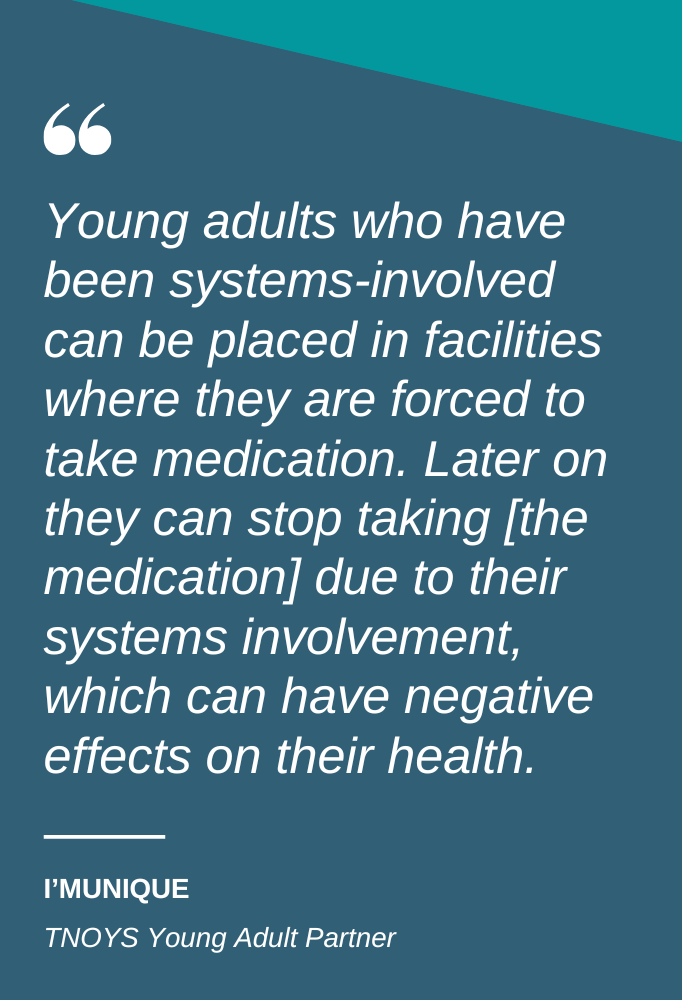
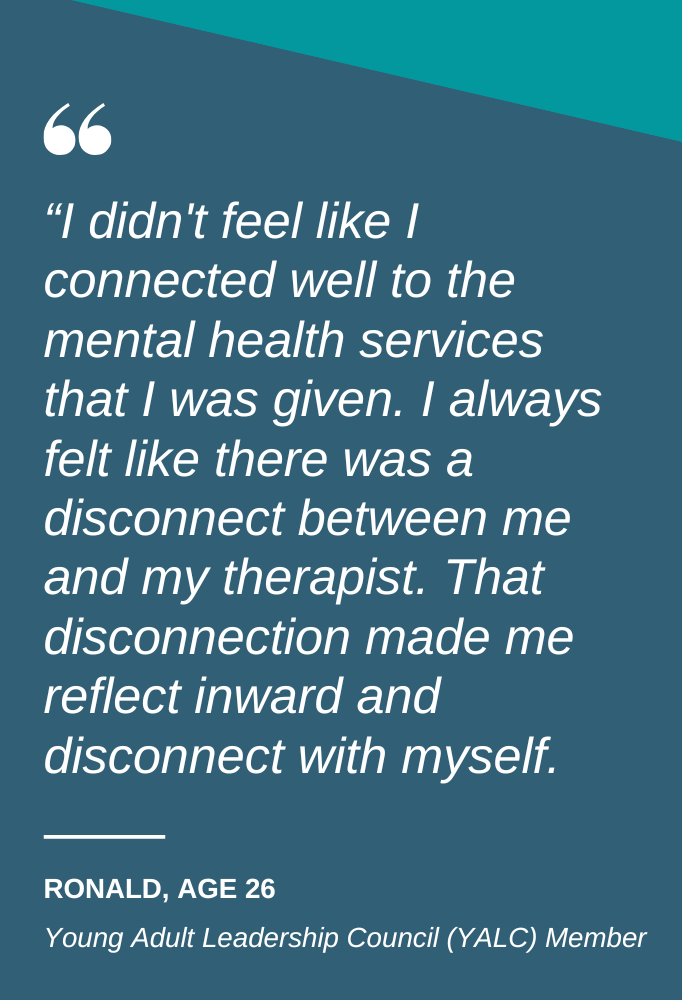
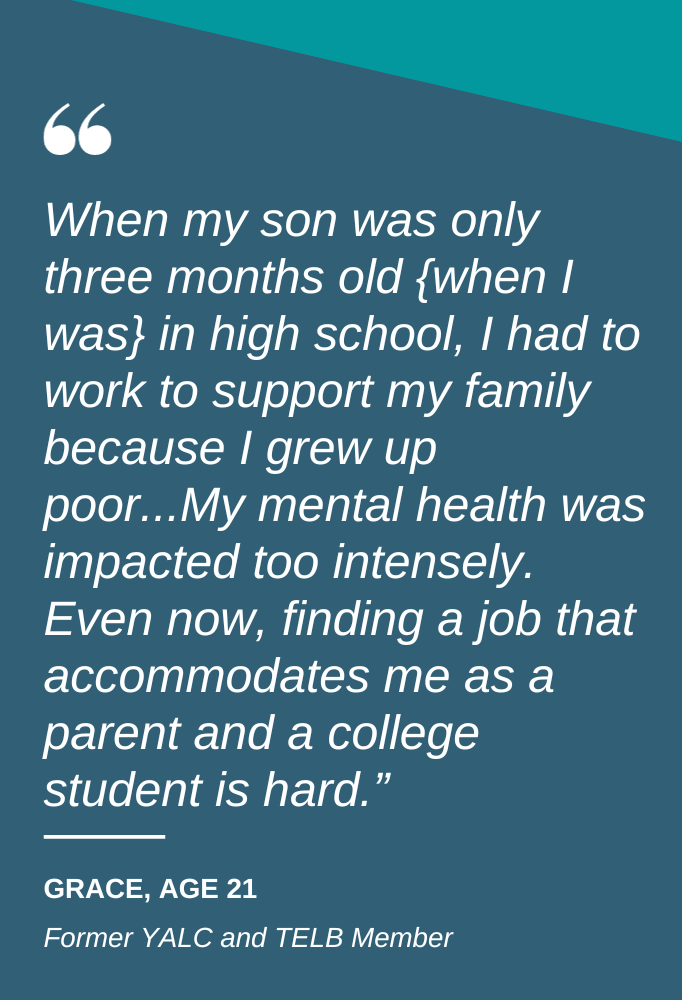
Lack of Sexual Health Resources/ Education
Young adults who are at risk or impacted by various systems face significant gaps in reproductive health and education. Research indicates that 20% of young people involved in child welfare nationwide become sexually active by the age of 13, compared to only 8% of the general population. Additionally, over half of teenage girls who age out of foster care or are in extended care in Texas become pregnant before reaching the age of 20. Moreover, youth experiencing homelessness are particularly vulnerable to commercial sexual exploitation (CSE) and sex trafficking, often resorting to survival sex, which involves exchanging sex for basic necessities like food, money, or a place to sleep.
Stigma, a lack of resources, and a lack of trusting relationships with adults are all factors that contribute to these stark outcomes. In listening to and learning from young people, TNOYS found that YYA overwhelmingly reported the need for trusted adults who can have age-appropriate discussions with youth and share resources. YYA stress that receiving information earlier could have enabled them to avoid consequences like unwanted pregnancy and STDs. Overall, data and conversations with young people show that much more needs to be done to ensure YYA have comprehensive information about reproductive health, safe sex, and healthy relationships.
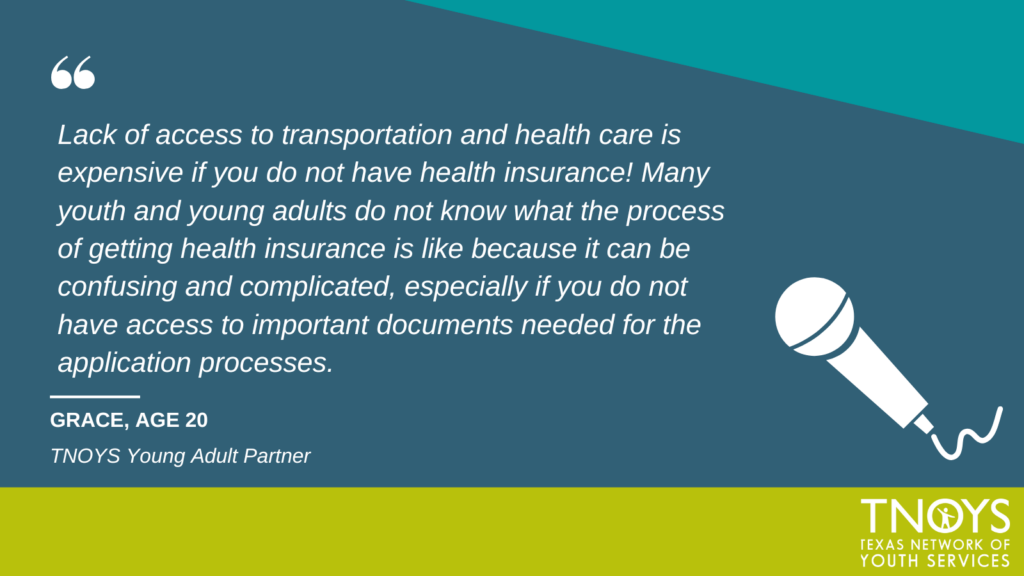
Recommendations
TNOYS’ healthcare brief Healthcare for Youth and Young Adults outlines strategic recommendations to address the key issues outlined above, including barriers to access and gaps in knowledge, addressing stigma and lack of trust, and gaps in Mental Health/ Behavioral Health Support.
Additional Resources from TNOYS
- TNOYS encourages youth-serving providers to review the We Are Vaxxed TX Toolkit, a comprehensive resource for YYA and direct services providers to find up-to-date information on COVID-19 vaccines and how to combat vaccine hesitancy.
- TNOYS’ Transition-Age Youth Life Skills Study Guides which systems-involved youth with a comprehensive, central resource to help them in their transition into adulthood and independent living. The section on Health and Safety reviews important topics such as nutrition, safe sex, self care and mental health, and more.
- The youth engagement resources page aims to help organizations and/or professionals to center youth voice and youth-adult partnership in their own work.
- TNOYS’ Youth Homelessness Resource Center provides a range of resources for professionals that serve YYA experiencing homelessness to overcome obstacles and achieve healthy development.
- TNOYS’ CSEY Resource Center aims to support youth-serving providers in preventing Commercial Sexual Exploitation of Youth (CSEY) and meeting the complex needs of survivors.
- TNOYS’ Emergency Response Resource Center is a compilation of relevant information for stakeholders, including TNOYS members, other youth service providers, and first responders, as they work to keep YYA and families safe during natural disasters and emergencies.
Citations
2. Physical Health Problems and Barriers to Optimal Health Care Among Children in Foster Care – ScienceDirect
3. Trauma-Informed Pediatric Primary Care: Facilitators and Challenges to the Implementation Process
